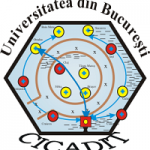The organizers do not cover the travel and accomodation cost for participants.
More information on accommodation will be provided to the participants upon selection for the event.
Transportation. There are non-stop flights to Bucharest from most major European cities and in the Middle-East and connecting flights from the United States, Canada, Australia and New Zealand. Most international flights arrive at Henri Coanda (Otopeni) Airport. Airport facilities include ATM, currency exchange office, Taxi Desk and car rental. The airport is connected with the city center by official taxis and express buses. Bucharest’s main train station – Gara de Nord – is a major rail centre with daily connections from/to cities throughout Europe and main cities in Romania. There are daily trains from/to Athens, Belgrade, Budapest, Istanbul, Kiev, Moscow, Prague, Sofia, and Vienna. Trains from/to Western European cities run via Budapest. Bucharest’s public transportation network includes: bus (“autobuz”), tram (“tramvai”), trolley bus (“troilebuz|), subway (“metrou”) and taxi. Read more
Accommodation. Bucharest has a full range of accommodation facilities, at different rates and standards. We will provide our recommendation to the selected participants, at about 20-40 Euro/night.
Visas. Citizens of virtually all European countries, as well as Australia, Canada, Israel, Japan, New Zealand and the USA, do not require visas to visit Romania for short-stays (up to 90 days). For citizens from other countries, visas are issued at Romanian consulates. The bearers of a visa with 2 or multiple entries, a long-term visa or a residence permit issued by Schengen Member States shall no longer be required to hold a short-stay visa. If you need an official invitation to get the visa, please contact the organisers well in advance.Read more








 Ashley Broadbent, Arizona State University (USA)
Ashley Broadbent, Arizona State University (USA)
 Sorin Cheval, University of Bucharest / National Meteorological Administration / “Henri Coandă” Air Force Academy (Romania)
Sorin Cheval, University of Bucharest / National Meteorological Administration / “Henri Coandă” Air Force Academy (Romania) Matthias Demuzere, University of Ghent (Belgium)
Matthias Demuzere, University of Ghent (Belgium) Andreas Matzarakis, German Meteorological Service, Freiburg (Germany)
Andreas Matzarakis, German Meteorological Service, Freiburg (Germany)
 Oded Potchter, Tel Aviv University (Israel)
Oded Potchter, Tel Aviv University (Israel) Hendrik Wouters, (Belgium)
Hendrik Wouters, (Belgium)

